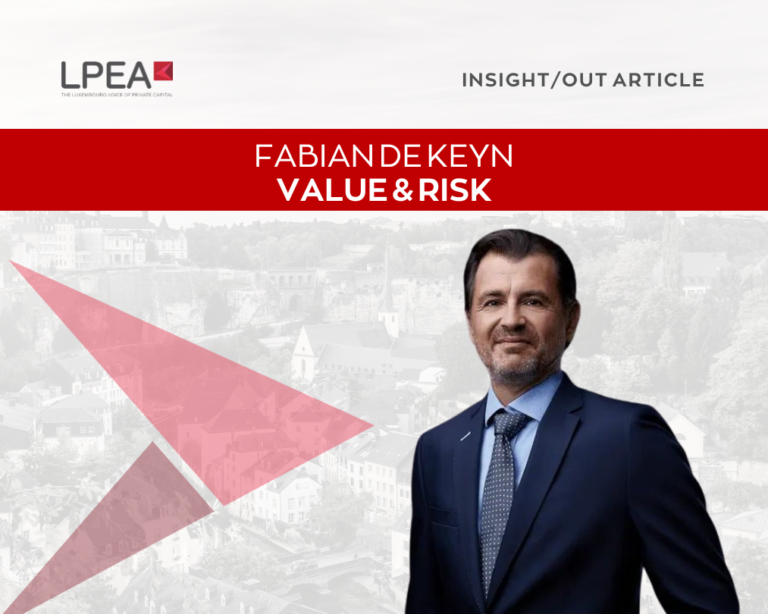Article by LPEA in collaboration with members of the ESG reporting taskforce, as published in Insight/Out magazine #34.
As environmental, social, and governance (ESG) considerations remain strategic within the European Union, the Private Equity (PE) and Venture Capital (VC) sectors continue to progress on how to incorporate ESG considerations throughout the investment lifecycle. While the recent Omnibus developments have introduced a degree of regulatory uncertainty, the expectation from limited partners (LPs) and other stakeholders for clear, measurable ESG outcomes continues to be unwavering.
At the same time, Artificial Intelligence (AI) is revolutionizing how organizations operate—unlocking new efficiencies, informing better decision-making, and introducing transformative capabilities across industries. In the context of ESG integration, AI’s potential is particularly interesting. Yet, for its adoption to be both impactful and sustainable, it needs to be guided by a clear framework of responsibility, accountability, and ethical alignment.
This article examines how AI can support operational excellence in ESG integration at three interconnected levels within the PE/VC ecosystem:
- The Fund-to-end investor ESG reporting level;
- The portfolio company-to-Fund ESG management level; and
- The overarching concept of responsible AI and digital sustainability, as it relates to both fund managers and portfolio companies navigating talent and governance transitions.
The Fund-to-end investor level: ESG reporting as strategic transparency
At the highest level, the interface between fund managers and investors has undergone a paradigm shift. ESG reporting has evolved into a central theme, driven by mandatory regulatory developments or management of internal reporting, as well as the broader societal demand for purpose-driven investments.
Investors increasingly expect not only ESG metrics but also alignment with global sustainability goals. They seek comparability, consistency, and verifiability across funds and asset classes.
In this environment, fund managers are challenged to efficiently collect, validate, and interpret vast amounts of ESG data across diverse portfolio companies and sectors. AI, when deployed strategically, offers the ability to help in streamlining these reporting needs while enhancing accuracy and timeliness.
Yet, the role of AI extends beyond automation. At this level, AI can help in enabling forward-looking insights. Through algorithmic analysis and trend detection, fund managers can identify emerging risks and opportunities across their portfolios, evaluate climate scenarios, and map materiality in a more dynamic manner.
This intelligence can help enhance the quality of dialogue with LPs. Rather than viewing ESG reports as compliance documents, fund managers can position them as narratives of long-term value creation, backed by data, context, and predictive analytics. This approach, however, must be anchored in transparency regarding AI methodologies, clear audit trails, and a commitment to data integrity.
The portfolio company level: ESG integration and management as value creation
For PE and VC firms, ESG integration at the portfolio company level is a strategic imperative, which may influence long-term performance, reputational resilience, and increasingly, exit valuation.
Effective ESG management may include robust systems for tracking environmental footprints, social equity, workforce diversity, supply chain integrity, and governance structures, while acknowledging for the heterogeneity of portfolio companies—ranging from early-stage start-ups with limited reporting infrastructure to mature enterprises with complex operational ecosystems.
In this context, AI may help in supporting operational excellence by embedding ESG into core business processes. AI-enabled platforms can serve as centralized repositories of ESG performance, integrating with finance, HR, procurement, and sustainability systems. This facilitates monitoring and ensures consistency across reporting cycles.
However, the real opportunity lies in embedding ESG into the strategic culture of portfolio companies. AI can provide insights into how sustainability initiatives correlate with operational performance, customer engagement, and employee retention. By making ESG more actionable, AI can help shift the perception of ESG from an external requirement to an internal source of competitive edge, which can in turn also provide a richer dataset to inform fund-level reporting and impact measurement.
It remains important to note that the successful deployment of AI for ESG purposes depends on building foundational data capabilities within portfolio companies. This includes implementing a culture of data governance, and ensuring that ESG roles are well-defined and empowered.
Responsible AI and digital sustainability: A cross-cutting priority
While AI may enhance ESG performance and reporting across the PE/VC value chain, its adoption introduces new dimensions of ethics and responsibility. As AI is becoming an integral part of the business strategy and operations, companies may be willing to rethink how they prepare their workforce for this transformation and ensure an ethical usage of AI. The shift is no longer limited to technology deployment—it extends into talent strategy and aligning workforce capabilities with AI integration plans, in a responsible manner.
For portfolio companies as well, operational excellence may increasingly involve their ability to equip teams with the skills and agility required in AI-enabled environments. Companies may want to embed re- and upskilling programs into the broader talent strategy, ensuring that employees can adapt to changing roles and technologies.
Fund managers can play a key role in supporting these transitions and promoting a culture of innovation and continuous learning across their portfolios, which may lead to sustainable value creation in the age of intelligent systems.
Aligning ESG ambitions with AI-driven operational excellence
As ESG considerations remain strategic in the agendas of investors and fund managers, the PE/VC sectors are steadily advancing their approaches to embedding ESG across the investment lifecycle. AI can introduce a new and powerful dimension to this landscape—one that can enable greater efficiency and foresight in ESG reporting and management.
At the fund level, AI can elevate ESG reporting from a compliance obligation to a strategic asset—enhancing transparency, supporting predictive insights, and strengthening investor confidence. At the portfolio company level, AI can help institutionalize ESG into the operational fabric of businesses, enabling them to continuously track, manage, and improve their sustainability performance. However, aligning talent strategies with the realities of digital transformation by encouraging workforce readiness, fostering adaptable, AI-literate teams and building a culture of continuous learning and ethical usage of AI is key.
Ultimately, operational excellence in the age of AI and ESG is not only about systems and structures; it is about ethics, responsibility, agility, and vision. The ability to pair technological innovation with ethical consistency and human-centric strategies will help in unlocking sustainable value for investors, companies, and society alike.




